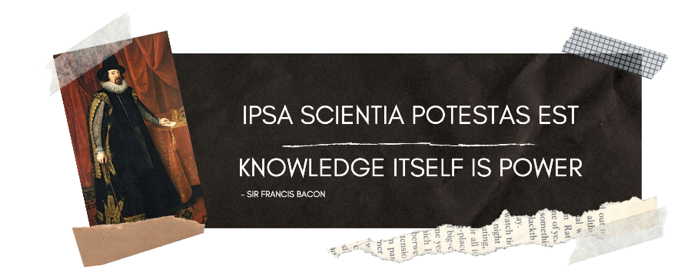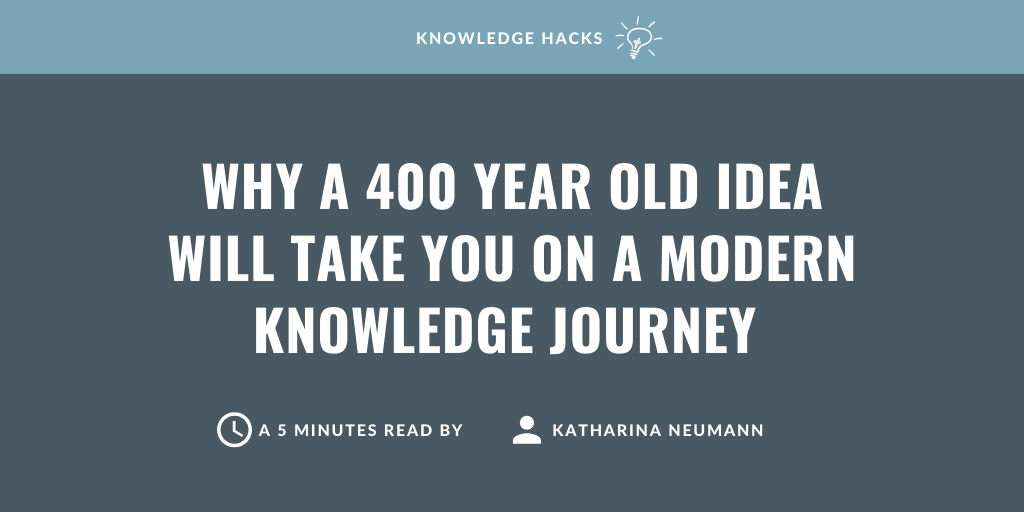“scientia potentia est”
Does this ring a bell with you? No? Then you have probably been one of the students who did not study Latin at high school. Yet, I strongly believe that you have already heard of this aphorism’s translation within your personal or educational career: Knowledge is power.

A Short History Check
The Latin aphorism goes back to Sir Francis Bacon’s work “Meditationes Sacrae” in 1597 and has been rephrased in various contexts by other philosophers such as Thomas Hobbes or Michel Foucault for example (Biography, 2014). Actually, the complete phrase from Sir Francis Bacon reads “ipsa scientia potestas est” and translates to “knowledge itself is power” but for the sake of simplicity we will just go with “knowledge is power”. As philosopher, attorney and statesmen living from 1561 to 1626, Sir Francis Bacon has had great influenced on the world of science and knowledge in the era of renaissance (Klein, 2016). If you have followed some classes on research methodology you may be familiar with inductive and deductive reasoning. While deduction was considered the common approach back at that time, Sir Francis Bacon argued that knowledge can only be developed upon inductive reasoning and careful observation. He has therefore been called the father of empiricism.
You may now wonder what a philosopher from over 400 years ago has to do with the blog post you are currently reading. If knowledge is power, it is also a manageable asset for individuals, start-ups, big corporations, governments and NGOs – literally for everyone. Therefore the right approach to manage this resource needs to be found. Within my blog posts, I would like to invite you on a journey into the world of knowledge management, a topic by which I have been fascinated by since my Bachelor studies in International Business. Since graduating in the beginning of 2018, I have worked in two international companies within the fashion and e-commerce sector and realized that companies who actively take a step towards encouraging employees to share their knowledge and thereby contributing to an organizational knowledge base, profit from a rewarding knowledge and working environment.
Intrinsic Motivation and Higher Life Satisfaction
In particular, the question how to promote knowledge sharing behavior is a fascinating one, as it includes psychological aspects of human behavior. According to a 2015 research investigating the relation between informal help and subjective well-being in a cross-cultural context, “individuals helping others are more likely to report a higher level of life satisfaction than their less helpful counterparts” (Oarga et. al, 2015, p. 251). Within a sample of 23 countries, the researchers tested whether the effect of an individuals’ helping behavior on their well-being is either weakened or strengthened depending on their expectations of receiving a reward or their cultural setting, as in certain countries “helping represents a widespread behavior” (p. 243). Following the self-determination theory, helping others is good for the personal well-being if it is intrinsically motivated i.e. the individual enjoys the act of helping someone per se and does not expect rewards in return. Yet, a culture where helping is a common ritual influences the individual’s satisfaction to a certain degree. The authors also asked the question why helping others provides “greater emotional benefits when individuals do not expect help to be reciprocated” (p. 251). The answer: extrinsic goals such as the fear of punishment or the expectation of a negative outcome for the individual are “false” motivators, which do not positively influence the individual’s well-being or health.
Have you ever thought about what motivates you to help others? Is it a smile or a simple “thank you” that encourages you? Let me know what you think in the comments section below this post. As for me, I can definitely support the view of the self-determination theory, as helping others is intrinsically motivating. Most of the times, I even receive rewards such as positive verbal or non-verbal feedback. If the topic I am helping with is a bit more complex, I might even have to do some research myself, which in return leads to a gain in knowledge for me.
Are you ready to follow me on our knowledge journey?
Within the next weeks, you will hear more about terms such as organizational knowledge base, knowledge sharing behavior and knowledge management – that sounds like lots of knowledge, doesn’t it? But no need to be scared! Knowledge Management does not have to become a huge impervious project, it can be executed on a small scale, individual level – and that is what I would like to focus on. I will provide you with small and simple knowledge hacks and tutorials on tools you use every day at work or university: Word, WordPress, OneNote and Co.
I believe in “sharing is caring” and the same is true for resources and ideas. If you have any topic you would like to know more about, let me know in the comments section below.

Bibliography
- Biography.com “Francis Bacon”. (2014). Retrieved 6 March 2020, from https://www.biography.com/scholar/francis-bacon
- Klein, Jürgen, “Francis Bacon”, The Stanford Encyclopedia of Philosophy (Winter 2016 Edition), Edward N. Zalta (ed.). Retrieved 6 March 2020, from https://plato.stanford.edu/archives/win2016/entries/francis-bacon/
- Oarga, Cristina & Stavrova, Olga & Fetchenhauer, Detlef. (2014). When and why is helping others good for well-being? The role of belief in reciprocity and conformity to society’s expectations. European Journal of Social Psychology. 45. 10.1002/ejsp.2092.
- Picture within Collage: Sir Francis Bacon (1561-1626) Baron Veru – Paul van Somer als Kunstdruck oder handgemaltes Gemälde. (2020). Retrieved 6 March 2020, from https://www.kunstkopie.de/a/somer-paul-van/sirfrancisbacon1561-1626b.html




Hello Katharina,
First of all, thank you for this post that was very interesting. I liked the historical approach you chose.
I can only agree that sharing knowledge is gratifying. For me, the feeling of being useful and making a difference is what motivates me the most.
I am looking forward to more posts, especially hacks. I definitely could use some advice on Word for example. I feel like I am really bad at it sometimes, and every time I look for help online, the content I find is long and complicated, and I usually end up figuring things out on my own and wasting even more time.
Thank you,
Have a nice day!
Dear Juliette, thanks you very much for your personal insight into sharing. I believe there a not that many selfish people on this world and a bit of reward goes a long way.
Regarding knowledge hacks, I will definitely include Office365 into this blog project, so stay tuned for more! Hopefully, see you back on the blog next Wednesday!
Very interesting theme, with ancient time approach.
Knowlegment is a very high and also powerfull item.
Besides this you will found it in common in world history.
The people with knowlegment have the power.
Thank you very much for your feedback on my first article! Indeed the topic of knowledge management is highly important, yet often neglected or taken for granted within the corporate world. Stay tuned for more articles on knowledge management and work hacks every Wednesday!
Dear Katharina
Thank you for that intresting post about intrinsic motivation and higher life satisfaction.
I thougth alot about this in my life and wondered where my intrinsic motivation comes from. I found that it is actually depending also on the people around me and the things you wrote about. Did you ever read “who i am and if so how many” from richard david precht? Very intresting lecture about humans and how they act and why.
Looking forward to your next post.
Thank you
Dear Hans, thank you very much for your feedback and personal insights into your intrinsic motivation. I haven’t heard about the book yet, but will definitely take a look at it! Thanks for the recommendation. I hope you’ll return next Wednesday for the upcoming article.
Dear Katharina, thank you very much for your blog post. I’m really looking forward to learn more about how Knowledge Management can be implemented at an individual level 🙂
P.s. Maybe a tutorial for Excel will be interesting as well!
Hi Margherita, many thanks for your feedback and the inspiration for a topic – I will definitely include some tutorials. Is there anything about Excel you would like to know in particular?
well, thanks for sharing your knowledge!
Thanks, Rebecca – stay tuned for more! 🙂
I’m really wondering what your recommendations for the “motivation” piece are. I’ve used a lot of knowledge management systems, forums, rewarding tools and so on but this is focusing mainly on the ones that are active contributors already. I’m looking for ways on how to activate passive users and keep them motivated on the long turn. Looking forward to your next episodes of the blog.
Hi Kilian, thanks for sharing your insights. Indeed motivational theory focuses on different triggers, yet users first have to understand the potential value added for themselves or others in order to become an active participant. Some might never be actively sharing their knowledge, as it is just not in their nature. I believe that first one needs to find out what exactly motivates people in your given context – both the active and passive ones and then start developing a strategy how to get the passive users of the systems on board. Definitely an interesting topic one can research more into – maybe in the upcoming blog posts. Stay tuned! 🙂
Hi Katharina, that’s a really interesting topic which I love to learn more about within the following weeks. I think I am person that is also motivated by helping others as it makes me feel happy. So I am intrinsically motivated. Looking forward to what is up next.
Hi Jenny, thanks for your positive feedback and the insights into your motivation for helping others. Looking forward to seeng you back on my blog, soon!